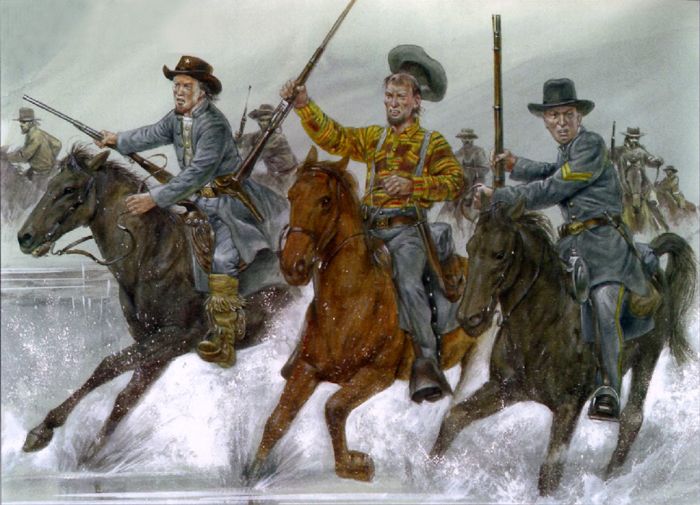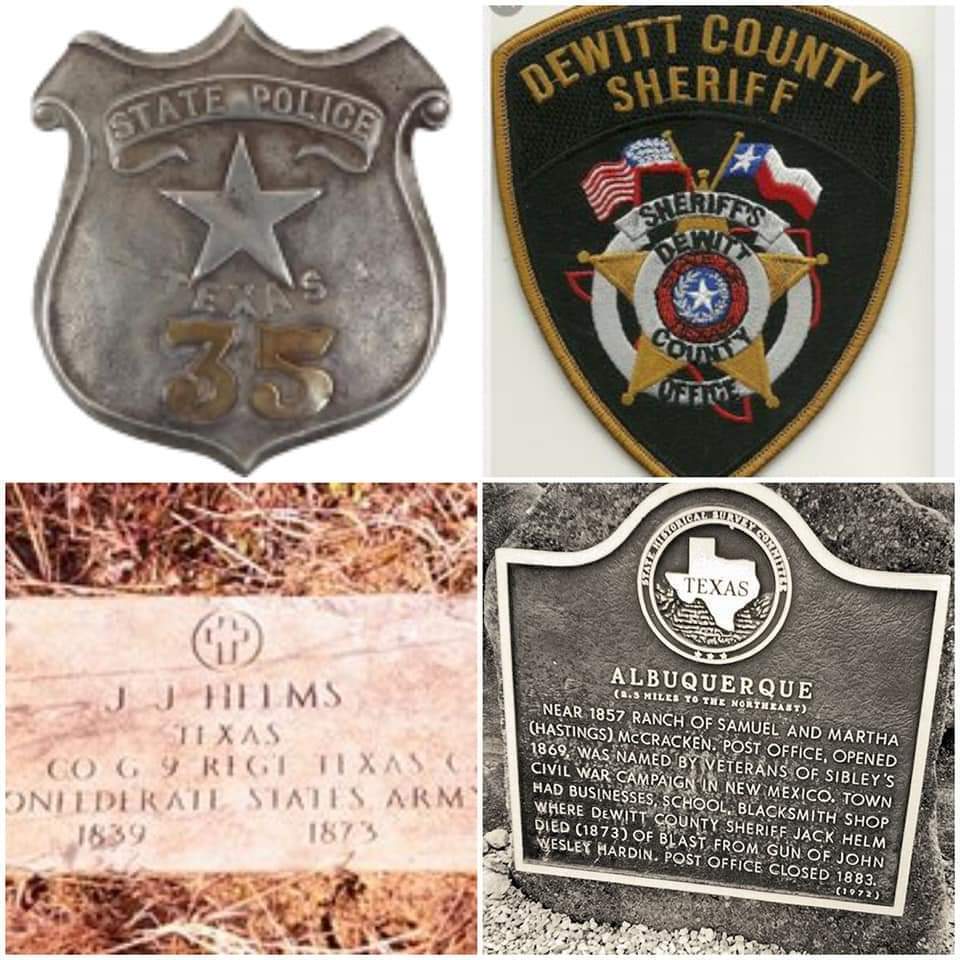
The Double-Edged Badge: Jack Helm, Texas Lawman and Feudist
In the rugged, untamed expanse of post-Civil War Texas, where the law was often a whisper against the roar of six-shooters, men like Jack Helm carved out their legends in blood and dust. A name etched into the annals of this violent era, Helm epitomized the paradox of the frontier lawman – a figure sworn to uphold order, yet often caught inextricably in the very chaos he was meant to quell. His life, marked by fierce loyalty, ruthless efficiency, and a fatal entanglement in the infamous Sutton-Taylor Feud, serves as a vivid, often brutal, chapter in the saga of the Texas frontier.
Jack Helm was not born into prominence, nor did he seek the kind of fame that graces history books with gilded letters. Instead, he emerged from the crucible of DeWitt County, a region then boiling over with animosity and vendetta. Like many of his contemporaries, details of his early life are sparse, shrouded in the mists of time and the scarcity of records from a land still wrestling with its identity. What is known, however, is that by the early 1870s, Helm had established himself as a man of formidable presence and unwavering resolve. Tall, imposing, with eyes that bespoke a man who had seen too much and feared too little, he commanded respect, often enforced by the iron will and ready gun at his hip.
His entry into law enforcement, serving as a Deputy Sheriff in DeWitt County, was a testament to his reputation. In an era when lawmen were often chosen not for their legal acumen but for their ability to project authority and enforce it with a heavy hand, Helm was a natural fit. He was known for his uncompromising pursuit of justice, or at least his version of it. Yet, the lines between right and wrong, lawman and outlaw, were often blurred in the powder-smoke haze of the Texas frontier. Personal loyalties and deep-seated animosities frequently superseded the letter of the law, and Helm, for all his official standing, was no exception.

The stage for Helm’s tragic destiny was set by the Sutton-Taylor Feud, a generational bloodbath that would consume DeWitt and Gonzales counties for years. Ignited by post-Civil War resentments, fueled by accusations of cattle rustling, and exacerbated by political divisions, the feud pitted the Sutton faction, led by the formidable Bill Sutton and often aligned with the state’s “Regulators,” against the powerful Taylor clan and their allies, often referred to as “Jayhawkers.” This wasn’t a simple conflict between good and evil; it was a sprawling, internecine war where families were torn apart, and entire communities lived under a constant threat of violence.
Jack Helm, despite wearing a badge, found himself firmly aligned with the Taylor faction. The reasons for his allegiance are complex, likely rooted in local ties, shared grievances, and perhaps a personal sense of justice that saw the Taylors as the wronged party. Once committed, Helm’s loyalty was absolute, and his involvement in the feud was swift and decisive. He became a principal enforcer for the Taylors, his badge lending a veneer of legality to actions that were often purely retaliatory.
One of the turning points in the feud, and a moment that irrevocably cemented Helm’s fate, occurred in March 1869. While Helm was not directly involved in the initial act, the murder of Charles and William Taylor by members of the Sutton faction ignited a vengeful fire that Helm would help stoke. The subsequent pursuit of Bill Sutton by the Taylors and their allies, including Helm, became relentless.
Helm was a central figure in several high-profile incidents. He was implicated in the killing of Joe Tumlinson, a Sutton supporter, and was known for his relentless tracking of his targets. Contemporary accounts describe Helm as a man driven by a singular purpose once he set his sights on an enemy. He was reportedly a cool and deadly shot, and his reputation alone often preceded him, striking fear into the hearts of those on the opposing side. "Helm was a man of iron nerve and desperate courage," recalled the notorious gunfighter John Wesley Hardin in his autobiography, a grudging respect that would later take a dark turn.
It was in this cauldron of revenge that Jack Helm found an unlikely, and ultimately fatal, ally: John Wesley Hardin. Hardin, a name synonymous with cold-blooded killing and unparalleled marksmanship, was himself entangled in the fringes of the Sutton-Taylor Feud, having family ties to the Taylor faction through his cousin, Mannen Clements. In a frontier where alliances were forged in blood and necessity, Hardin and Helm, two of Texas’s most dangerous men, briefly united.
Their partnership was born of mutual interest: the elimination of common enemies. In May 1873, Helm, along with Hardin and Jim Taylor (a key figure in the Taylor clan), ambushed and killed J.B. Morgan, a prominent Sutton supporter. This act was a clear demonstration of their shared ruthlessness and their commitment to the feud. Hardin, in his memoirs, would later detail their exploits, painting Helm as a formidable figure who was not afraid to confront any man. "Helm and I were two of a kind in some respects," Hardin wrote, hinting at a shared capacity for violence and an unwavering will.
However, the alliance between such volatile personalities was always destined to be short-lived and treacherous. The feud was escalating, and the Texas Rangers, under the command of men like Captain Leander McNelly, were beginning to take a more aggressive stance, making the state too hot for many of the participants. Lawmen and outlaws alike found themselves increasingly targeted, and the bonds of loyalty, even among those united by blood and vengeance, began to fray under the immense pressure.
On a sweltering July day in 1873, in the town of Gonzales, Jack Helm’s violent odyssey reached its abrupt and deeply ironic conclusion. He was ambushed and killed not by a Sutton loyalist, but by his erstwhile allies: John Wesley Hardin and Jim Taylor. The circumstances surrounding Helm’s death are murky, but Hardin, ever the survivor, recounted the chilling details in his memoirs, offering his perspective on the betrayal.

According to Hardin, Helm had become a liability, or worse, a potential betrayer. He claimed Helm was planning to turn him over to the authorities for the bounty on his head. Whether this was true, or merely Hardin’s justification for a pre-emptive strike, remains debated by historians. What is undeniable is the brutal efficiency of the killing.
As Helm sat in a local saloon, Hardin and Jim Taylor confronted him. Accounts suggest a brief, tense exchange, likely over Helm’s perceived disloyalty. As Helm turned to face his accusers, Hardin drew his pistol and fired, the shot striking Helm in the head. Jim Taylor, Helm’s former comrade-in-arms and a man Helm had fought alongside, then delivered the coup de grâce, reportedly firing additional shots into Helm’s body to ensure he was dead. The man who had worn a badge, who had pursued justice with a deadly hand, met his end at the hands of those he had once considered allies, a stark testament to the treacherous nature of frontier feuds.
Jack Helm’s death was not just the end of a man, but a stark symbol of the feuds’ indiscriminate brutality. It underscored the fragile nature of alliances in a world where survival often depended on a quick draw and quicker wits. His story is a poignant illustration of the blurred lines that defined the Texas frontier – a place where a man could be a lawman one day, a feudist the next, and an outlaw in the eyes of the law, all while believing himself to be on the side of justice.
Helm’s legacy remains complex. He was undoubtedly a brave and effective lawman, willing to face down danger others would shy from. Yet, he was also a man consumed by the very violence he was meant to suppress, a perpetrator as much as a victim of the feud that ultimately claimed his life. He represents the "gray areas" of the Old West, where the rule of law was still embryonic, and personal honor, family loyalty, and the pursuit of vengeance often held greater sway than any statute.
In the end, Jack Helm’s life serves as a cautionary tale of a man caught between two worlds: the nascent order he was sworn to uphold and the chaotic, deeply personal conflicts that defined his era. He lived by the gun, a badge on his chest and vengeance in his heart, and ultimately, he died by it, a victim of the very violent code he embraced. His story endures as a powerful reminder of the raw, untamed spirit of the Texas frontier, and the profound human cost of its struggle for order.


